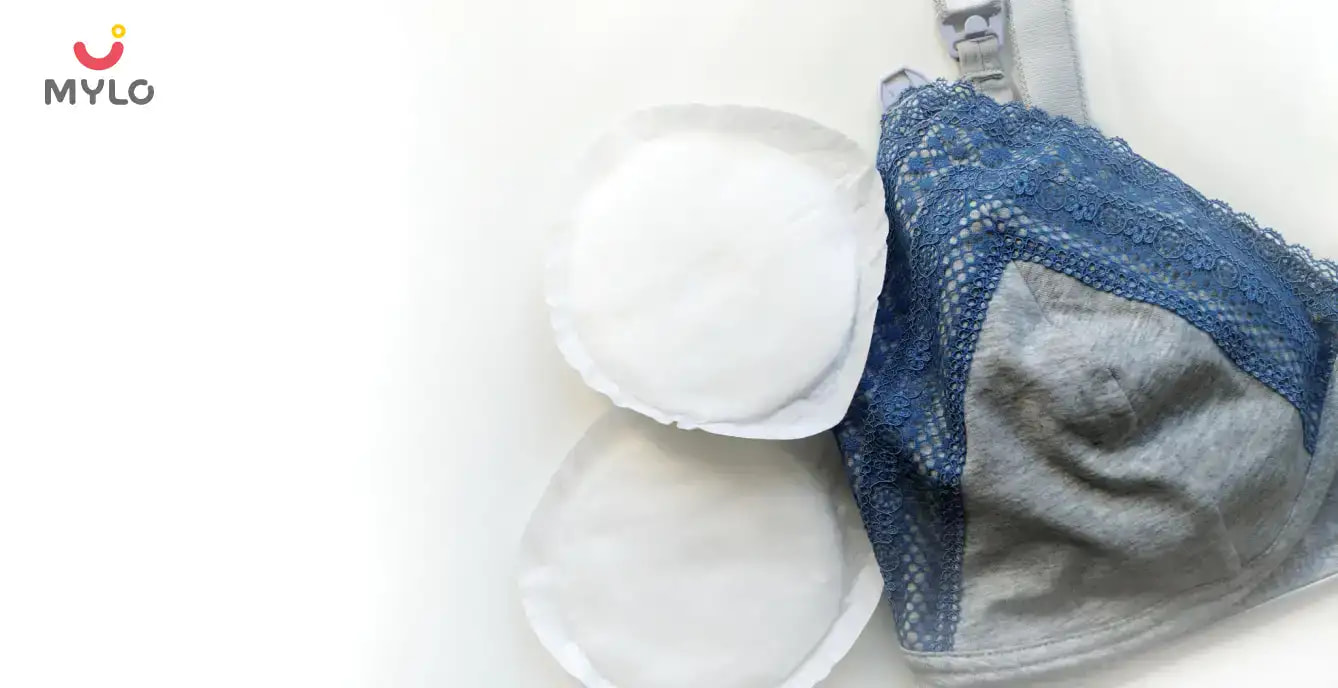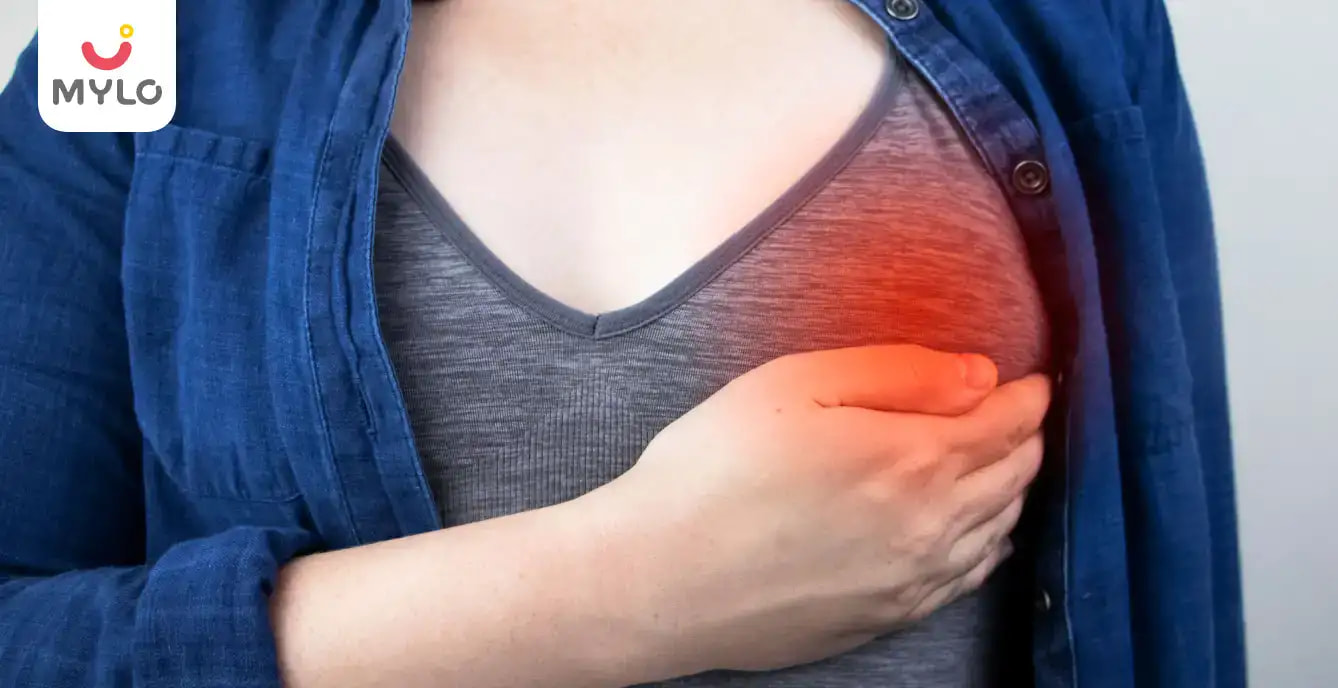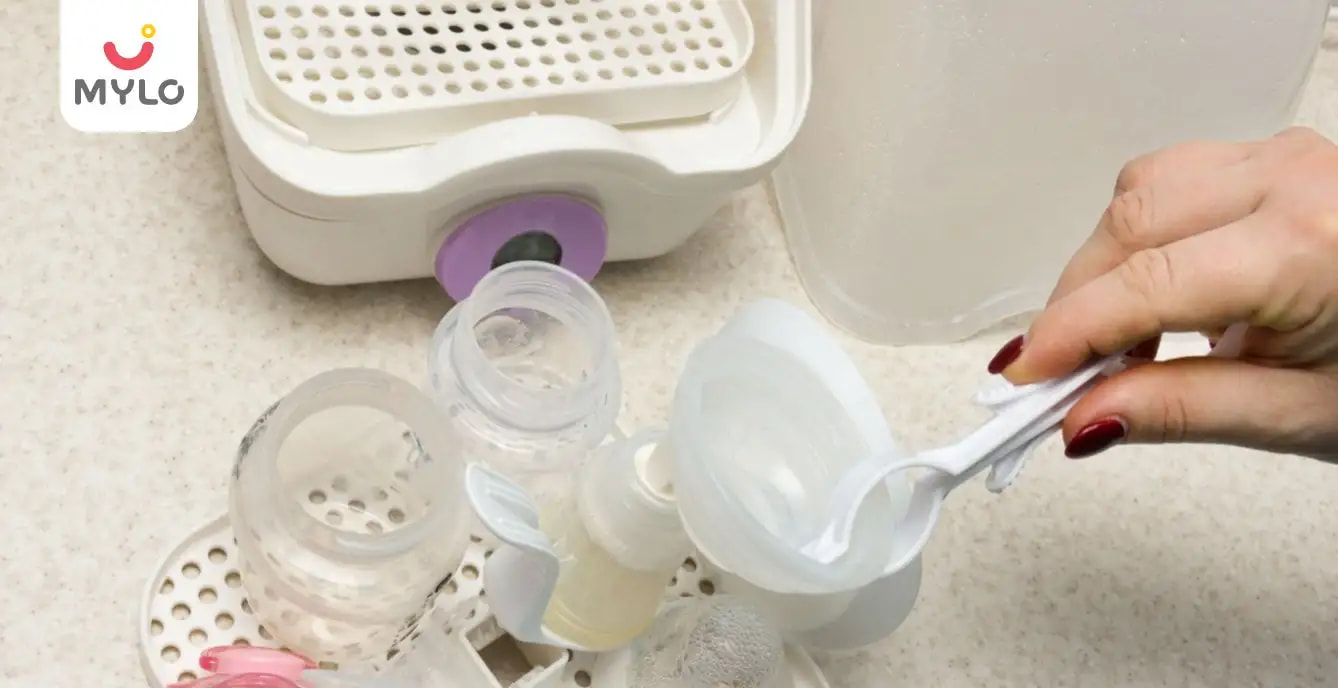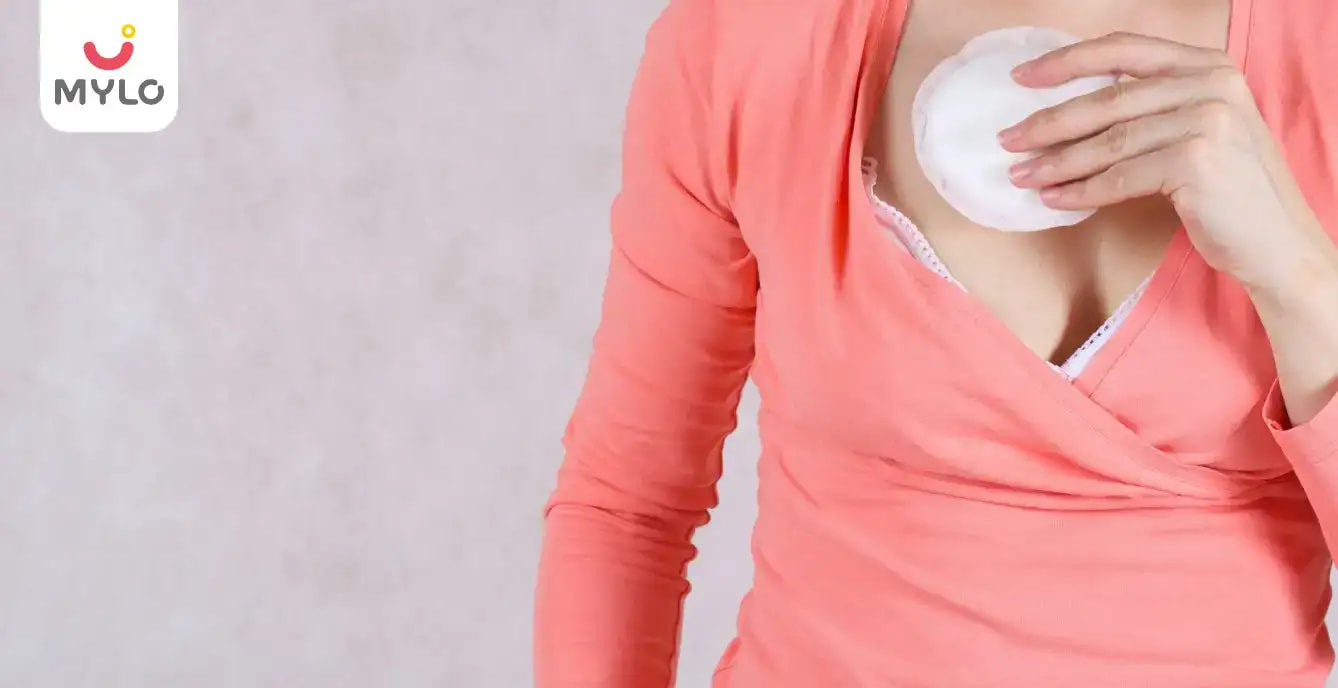Home

Breastfeeding & Lactation

How To Prevent Breast Milk Leakage During Breastfeeding
In this Article
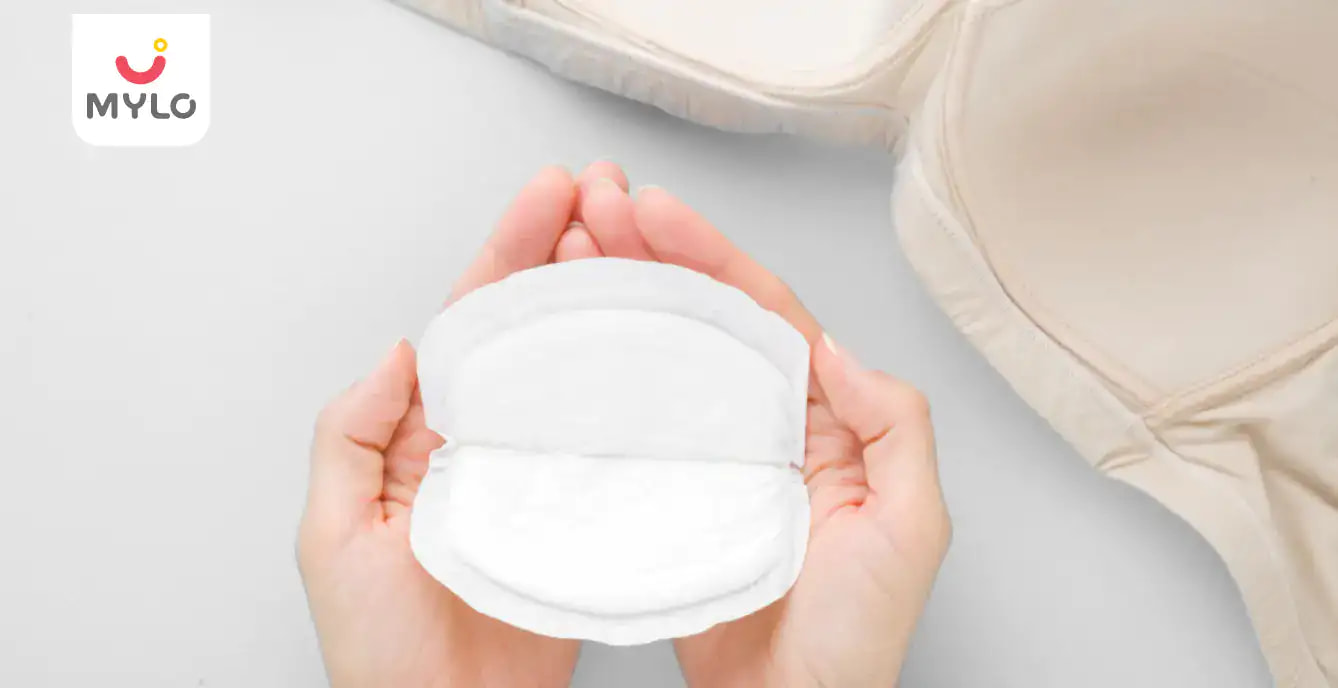
Breastfeeding & Lactation
How To Prevent Breast Milk Leakage During Breastfeeding
Updated on 3 November 2023
Having a baby is a great blessing and an even better blessing is getting a chance to breastfeed your child. Breastfeeding gives the mother a chance to bond with her baby as nobody else can, which is a blessing. However, there are times when your breasts may feel overwhelmed and start leaking.
Leakage of breast milk is a frequent, albeit uncomfortable, side effect of breastfeeding. When your breast milk first starts coming in, it can squirt or trickle from your breasts at any time.
If you've just had a baby, you may not even notice that your breast is leaking. Once your breast milk production adjusts to your baby's needs, the leaking may decrease or perhaps cease.
You may like : Can a padded maternity bra prevent breastmilk leakage?
Why Do Breasts Leak?
If you're wondering why your breasts are leaking during breastfeeding and whether it is a worrisome sign, well, don't worry. Leaking breasts are very common during breastfeeding. You can often spot your nursing bra wet because of milk leakage. However, here are a few reasons that will help you understand why milk leaks during breastfeeding:
1. Emotional Triggers
Hormonal response to milk release might be influenced by hearing or seeing your baby scream, viewing a picture or video of your kid, or even just thinking about your baby. Some women experience a tingling or 'zinging' just before the milk comes out. The let-down, or milk ejection reflex, is what you see here.
2. Scheduled Feeds
There are plenty of mothers who stick to a proper clockwise feeding schedule as opposed to those mothers who feed on demand. This is also usually one of the most common reasons for leaking breasts.
3. Oversupply
Suppose your body is producing milk in excess quantities. In that case, there is every possibility that your breasts will leak more frequently giving you a way to use a good quality nursing maternity bra to use during breastfeeding days. A good-quality bra will ensure that your breasts are comfortable and healthy.
4. Breast Storage Capacity
The amount of milk that can be stored in smaller breasts is lower. As if it were a container: There will be less milk in a smaller container. Women with smaller breasts may need to breastfeed their babies more frequently, but this does not necessarily suggest that they produce less milk overall. The 'container' of breast milk will leak if you go too long between feedings.
5. While Breastfeeding
There are a few people who experience a leak from one breast while they are feeding their child from the other breast.
6. Change In Feeding Times
Although you may think, within the first few months of breastfeeding, that your life has become all about feeding your little one, there will be a time when your baby gets a little older, and the feeding becomes a little lesser. So, suppose, if you were feeding your baby every two hours, and as your baby got older, you now feed your baby once every 6 hours, you will initially start to leak around the time your baby used to feed. However, you don't have to worry because as your body gets used to the new schedule, your leaks will also subside.
Can You Stop Your Breasts From Leaking?
Access to the breasts regularly, without restriction, aids in the elimination of extra milk. Feedings should not be missed, and extended feeding sessions should be provided. The sphincter surrounding the nipple muscles is given a shape, and future leaks are prevented by using this method.
When you are away from your infant, you can halt the leaking by gently pressing your breast against your skin. Crossing your arms across your chest and lightly pressing them on your forearms is an excellent way to do this. When milk leakage is reduced over time, it is an indication that the body is managing the amount of milk it produces.
Breast pads can be used for dripping breasts since they absorb the drops and keep the breast dry. However, it is recommended that you replace them on a regular basis to avoid irritation and moisture around the nipples.
What Can You Do to Prevent Breast Leakage?
Preventing breast leaking can be accomplished in the following ways:
-
Breastfeeding the newborn quickly relieves pressure on the breasts that have built up over time. The manual expression of milk helps if the pressure persists even after the infant is satiated. A clogged breast infection known as mastitis, which can cause you to be in bed for up to 24 hours, can be prevented using this product.
-
Embarrassment can be avoided in public by donning patterned clothing to hide leakage locations. Avoid silk and use darker colors to look more polished. Wet spots can be concealed by wearing a jacket or a sweater.
-
Leaks are less likely to occur if you breastfeed your child right before bedtime. To be sure, the breasts are never empty. Maintaining a regular sleep schedule is essential.
-
To avoid dropping of milk, press the base of the palms across the nipples whenever the sensation is felt. While sitting across the table, you can stop the milk flow by cupping your chin in your hand and putting pressure on the nipples using your forearms. As soon as milk production begins, this should be done. Clogged milk ducts can result from any physical pressure applied during the first few weeks of lactation.
-
Place a bath towel on your bed before sleep to protect your mattress and keep your sheets dry.
-
Discreet milk collectors can be purchased by mothers and inserted into the bra. This way, you can supply your baby with milk as and when needed.
-
Mothers can also purchase nursing maternity mouded spacer cup bras online to ensure their breasts' well-being.
What Types of Breast Pads Should You Use?
These tips can help you avoid leaks while working on a substantial project or task or even save you from any kind of embarrassment:
-
Despite the availability of disposable breast pads, new mothers should exercise caution. Breastfeeding-related issues can arise when the wrong pad is used. To avoid nipple irritation, steer clear of those with a waterproof or plastic lining. There are also discreet pads that can be worn beneath the Maternity bra.
-
Cotton breast pads that can be washed and reused are also an option. A breast pad can last anywhere from two hours to eight hours.
-
Cloth breast pads that are washable and reusable can even be made at home. These are used by mothers who are hesitant to spend in breast pads because they are safer. The more experience you have as a mother, the more comfortable you will be with this method.
Conclusion
Every woman's breastfeeding experience is unique. First-time mothers will feel more at ease if they are able to talk about the difficulties they face. A new mother's desire to provide the finest life for her child should not be marred by self-doubt or shame caused by leaky breasts during the first few months.
References
URMC. Breast Care. www.urmc.rochester.edu



Written by
Vijay Kumar
Get baby's diet chart, and growth tips

Related Articles
Related Questions
Influenza and boostrix injection kisiko laga hai kya 8 month pregnancy me and q lagta hai ye plz reply me

Hai.... My last period was in feb 24. I tested in 40 th day morning 3:30 .. That is faint line .. I conculed mylo thz app also.... And I asked tha dr wait for 3 to 5 days ... Im also waiting ... Then I test today 4:15 test is sooooo faint ... And I feel in ma body no pregnancy symptoms. What can I do .

Baby kicks KB Marta hai Plz tell mi

PCOD kya hota hai

How to detect pcos

RECENTLY PUBLISHED ARTICLES
our most recent articles

Diet & Nutrition
গর্ভাবস্থায় আলুবোখরা: উপকারিতা ও ঝুঁকি | Prunes During Pregnancy: Benefits & Risks in Bengali

Diet & Nutrition
গর্ভাবস্থায় হিং | ঝুঁকি, সুবিধা এবং অন্যান্য চিকিৎসা | Hing During Pregnancy | Risks, Benefits & Other Treatments in Bengali

Women Specific Issues
স্তনের উপর সাদা দাগ: লক্ষণ, কারণ এবং চিকিৎসা | White Spots on Nipple: Causes, Symptoms, and Treatments in Bengali

Diet & Nutrition
গর্ভাবস্থায় পোহা: উপকারিতা, ধরণ এবং রেসিপি | Poha During Pregnancy: Benefits, Types & Recipes in Bengali

Diet & Nutrition
গর্ভাবস্থায় মাছ: উপকারিতা এবং ঝুঁকি | Fish In Pregnancy: Benefits and Risks in Bengali

Diet & Nutrition
গর্ভাবস্থায় রেড ওয়াইন: পার্শ্ব প্রতিক্রিয়া এবং নির্দেশিকা | Red Wine During Pregnancy: Side Effects & Guidelines in Bengali
- ইনার থাই চ্যাফিং: কারণ, উপসর্গ এবং চিকিৎসা | Inner Thigh Chafing: Causes, Symptoms & Treatment in Bengali
- গর্ভাবস্থায় ব্রাউন রাইস: উপকারিতা ও সতর্কতা | Brown Rice During Pregnancy: Benefits & Precautions in Bengali
- Velamentous Cord Insertion - Precautions, Results & Safety
- Unlock the Secret to Flawless Skin: 7 Must-Have Qualities in a Face Serum
- Unlock the Secret to Radiant Skin: How Vitamin C Serum Can Transform Your Complexion
- Gender No Bar: 10 Reasons Why Everyone Needs a Body Lotion
- Unlock the Secret to Radiant Skin How to Choose the Perfect Body Lotion for Your Skin Type
- Top 10 Reasons to Apply a Body Lotion After Every Bath
- Communication in Toddlers: Milestones & Activities
- How to Improve Vocabulary for Toddlers?
- A Comprehensive Guide to Understanding Placenta Accreta
- Vulvovaginitis in Toddlers Causes, Symptoms and Treatment
- A Comprehensive Guide to Understanding Cerebral Palsy in Children
- Bitter Taste in Mouth During Pregnancy: Understanding the Causes and Remedies


AWARDS AND RECOGNITION

Mylo wins Forbes D2C Disruptor award

Mylo wins The Economic Times Promising Brands 2022
AS SEEN IN
















- Mylo Care: Effective and science-backed personal care and wellness solutions for a joyful you.
- Mylo Baby: Science-backed, gentle and effective personal care & hygiene range for your little one.
- Mylo Community: Trusted and empathetic community of 10mn+ parents and experts.
Product Categories
baby carrier | baby soap | baby wipes | stretch marks cream | baby cream | baby shampoo | baby massage oil | baby hair oil | stretch marks oil | baby body wash | baby powder | baby lotion | diaper rash cream | newborn diapers | teether | baby kajal | baby diapers | cloth diapers |



